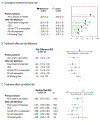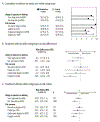Emollients to Prevent Pediatric Eczema: A Randomized Clinical Trial
- PMID: 40699587
- PMCID: PMC12287936
- DOI: 10.1001/jamadermatol.2025.2357
Emollients to Prevent Pediatric Eczema: A Randomized Clinical Trial
Abstract
Importance: Atopic dermatitis (AD) imposes a global health burden for children and is a risk factor for developing food allergy and asthma. Few studies have evaluated emollient intervention for primary AD prevention in infants not selected for risk.
Objective: To determine whether emollient intervention in infants not selected for risk reduces AD incidence by age 24 months.
Design, setting, and participants: A randomized, decentralized pragmatic clinical trial was conducted that involving 1247 infant-parent dyads recruited from 25 community-based pediatric and family medicine clinics that are members of 4 statewide practice-based research networks. Participants were recruited from July 2018 to February 2021, with follow-up completed through February 2023.
Intervention: Dyads were randomized to 1 of 2 groups: a daily full-body emollient application daily moisturizer group starting by age 9 weeks or a control group that refrained from emollient use.
Main outcomes and measures: The primary outcome was physician-diagnosed AD recorded in the patient's medical record by age 24 months. Participants completed quarterly electronic surveys to report adverse events and alert the team if an AD diagnosis had been made. Trained research coordinators abstracted participants' medical records.
Results: Of 1247 infants, 553 (44.3%) were female, and the mean (SD) age at randomization was 23.9 (16.3) days. At 24 months, the cumulative incidence of AD was 36.1% (SE, 2.1) in the daily moisturizer group and 43.0% (SE 2.1) in the control group, with a relative risk (RR) of 0.84 (95% CI, 0.73-0.97; P = .02), and the magnitude of effect was larger in the population not at high risk of AD (RR, 0.75; 95% CI, 0.60-0.90; P = .01). The protective effect was significantly modified by the presence of a dog in the home (RR, 0.68; 95% CI, 0.50-0.90; P = .01). There were no between-group differences in cutaneous adverse events.
Conclusions and relevance: This randomized clinical trial found that daily emollient application beginning before age 9 weeks in a representative US population not selected for risk reduced the cumulative incidence of AD at age 24 months. Implementing this approach to pediatric skin care may be a feasible way to reduce the burden of AD in US communities.
Trial registration: ClinicalTrials.gov Identifier: NCT03409367.
Conflict of interest statement
Hywel Williams was chief investigator of the BEEP trial – a Government-funded trial of 1394 infants at high risk of developing eczema”
Figures




References
-
- Al-Naqeeb J, Danner S, Fagnan LJ, Ramsey K, Michaels L, Mitchell J, et al. The Burden of Childhood Atopic Dermatitis in the Primary Care Setting: A Report from the Meta-LARC Consortium. J Am Board Fam Med. 2019;32(2):191–200. - PubMed
-
- Paller A, Jaworski JC, Simpson EL, Boguniewicz M, Russell JJ, Block JK, et al. Major Comorbidities of Atopic Dermatitis: Beyond Allergic Disorders. Am J Clin Dermatol. 2018;19(6):821–38. - PubMed
-
- Halling AS, Rinnov MR, Ruge IF, Gerner T, Ravn NH, Knudgaard MH, et al. Skin TARC/CCL17 increase precedes the development of childhood atopic dermatitis. J Allergy Clin Immunol. 2023;151(6):1550–7.e6. - PubMed
-
- Flohr C, England K, Radulovic S, McLean WH, Campbel LE, Barker J, et al. Filaggrin loss-of-function mutations are associated with early-onset eczema, eczema severity and transepidermal water loss at 3 months of age. British Journal of Dermatology. 2010;163(6):1333–6. - PubMed
Associated data
Grants and funding
LinkOut - more resources
Full Text Sources
Medical

